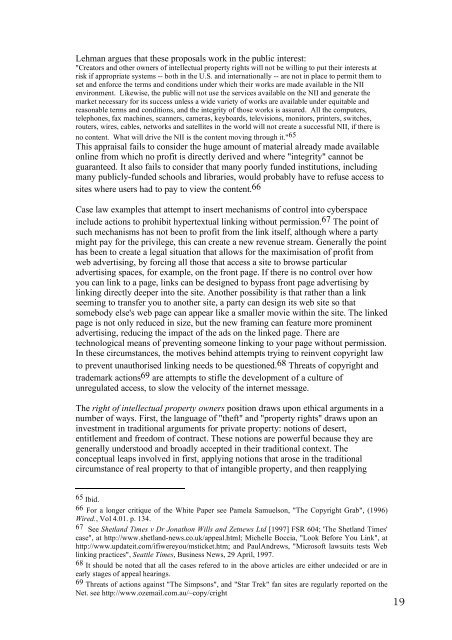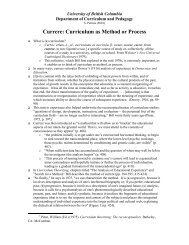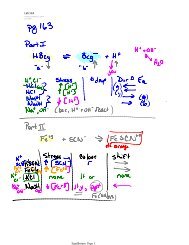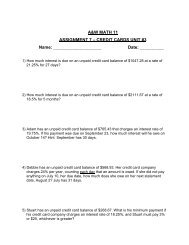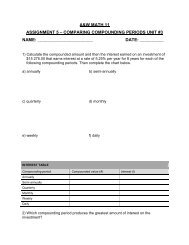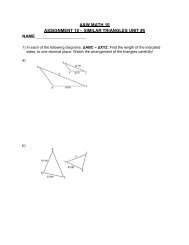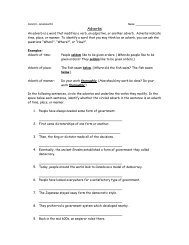ETHICAL BOUNDARIES AND INTERNET CULTURES
ETHICAL BOUNDARIES AND INTERNET CULTURES
ETHICAL BOUNDARIES AND INTERNET CULTURES
You also want an ePaper? Increase the reach of your titles
YUMPU automatically turns print PDFs into web optimized ePapers that Google loves.
Lehman argues that these proposals work in the public interest:<br />
"Creators and other owners of intellectual property rights will not be willing to put their interests at<br />
risk if appropriate systems -- both in the U.S. and internationally -- are not in place to permit them to<br />
set and enforce the terms and conditions under which their works are made available in the NII<br />
environment. Likewise, the public will not use the services available on the NII and generate the<br />
market necessary for its success unless a wide variety of works are available under equitable and<br />
reasonable terms and conditions, and the integrity of those works is assured. All the computers,<br />
telephones, fax machines, scanners, cameras, keyboards, televisions, monitors, printers, switches,<br />
routers, wires, cables, networks and satellites in the world will not create a successful NII, if there is<br />
no content. What will drive the NII is the content moving through it." 65<br />
This appraisal fails to consider the huge amount of material already made available<br />
online from which no profit is directly derived and where "integrity" cannot be<br />
guaranteed. It also fails to consider that many poorly funded institutions, including<br />
many publicly-funded schools and libraries, would probably have to refuse access to<br />
sites where users had to pay to view the content. 66<br />
Case law examples that attempt to insert mechanisms of control into cyberspace<br />
include actions to prohibit hypertextual linking without permission. 67 The point of<br />
such mechanisms has not been to profit from the link itself, although where a party<br />
might pay for the privilege, this can create a new revenue stream. Generally the point<br />
has been to create a legal situation that allows for the maximisation of profit from<br />
web advertising, by forcing all those that access a site to browse particular<br />
advertising spaces, for example, on the front page. If there is no control over how<br />
you can link to a page, links can be designed to bypass front page advertising by<br />
linking directly deeper into the site. Another possibility is that rather than a link<br />
seeming to transfer you to another site, a party can design its web site so that<br />
somebody else's web page can appear like a smaller movie within the site. The linked<br />
page is not only reduced in size, but the new framing can feature more prominent<br />
advertising, reducing the impact of the ads on the linked page. There are<br />
technological means of preventing someone linking to your page without permission.<br />
In these circumstances, the motives behind attempts trying to reinvent copyright law<br />
to prevent unauthorised linking needs to be questioned. 68 Threats of copyright and<br />
trademark actions 69 are attempts to stifle the development of a culture of<br />
unregulated access, to slow the velocity of the internet message.<br />
The right of intellectual property owners position draws upon ethical arguments in a<br />
number of ways. First, the language of "theft" and "property rights" draws upon an<br />
investment in traditional arguments for private property: notions of desert,<br />
entitlement and freedom of contract. These notions are powerful because they are<br />
generally understood and broadly accepted in their traditional context. The<br />
conceptual leaps involved in first, applying notions that arose in the traditional<br />
circumstance of real property to that of intangible property, and then reapplying<br />
65 Ibid.<br />
66 For a longer critique of the White Paper see Pamela Samuelson, "The Copyright Grab", (1996)<br />
Wired., Vol 4.01. p. 134.<br />
67 See Shetland Times v Dr Jonathon Wills and Zetnews Ltd [1997] FSR 604; 'The Shetland Times'<br />
case", at http://www.shetland-news.co.uk/appeal.html; Michelle Boccia, "Look Before You Link", at<br />
http://www.updateit.com/ifiwereyou/msticket.htm; and PaulAndrews, "Microsoft lawsuits tests Web<br />
linking practices", Seattle Times, Business News, 29 April, 1997.<br />
68 It should be noted that all the cases refered to in the above articles are either undecided or are in<br />
early stages of appeal hearings.<br />
69 Threats of actions against "The Simpsons", and "Star Trek" fan sites are regularly reported on the<br />
Net. see http://www.ozemail.com.au/~copy/cright<br />
19


